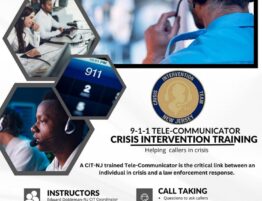
Twenty law enforcement officers and medical professionals in Sussex County are now better equipped to deal with emergency situations relating to mental health thanks to their completion of Crisis Intervention Team (CIT) training Friday afternoon at the county Fire Academy.
The 40-hour week of training consisted of a variety of instruction methods led by local mental health officials, police officers and other CIT experts. Because the program is new in the area — it was offered to county employees for the first time Oct. 15-18 and will be offered again in March — state Crisis Intervention Director Ed Dobleman, a retired police chief, helped instruct the program through role-playing and other classroom activities.
The CIT program offers knowledge about numerous mental illnesses and developmental disabilities, including Alzheimer’s disease and Tourette Syndrome, and what emergency responders can do when problems arise.
“It’s to teach them not only about what they’re seeing on the street, but also how to address it — how to de-escalate, how to diffuse a situation,” said Maggie Czykier, a Sussex County assistant prosecutor and coordinator of the program.
One of the main objectives of the program, Czykier said, is to strengthen the relationship between police officers and those in the mental health field. To help accomplish this, CIT organizers had enrollees switch seats every day so they could get to know other county professionals — even those in a different department or field — in case they ever need to work together.
“The goal is to have a little bit more collaboration,” Czykier said, “so the community people … would learn what law enforcement response is, and the law enforcement will understand better the mental health universe and special needs universe.”
Czykier said the class was made up of roughly two-thirds police officers, since they often respond to issues outside their expertise and need to be as well-versed as possible in a variety of areas.
“A lot of our officers in this county and across the state are also community providers,” Czykier said. “Everyone, they call the cops if something goes wrong, and sometimes it’s not a criminal situation, but they’re responding to provide not only medical assistance but (other) help as well.”
Marcus Lisa, a Byram police officer who participated in the program, felt the classes helped him understand that there can be several ways to handle a response depending on the nature of the individual in question.
“We get trained to respond (to) certain situations sometimes much differently than this training is providing,” he said, “so it was just a real good eye-opener, good experience to know that there are more ways to treat a situation, and sometimes things aren’t always what they first come across as.”
Cyzkier said she hopes to offer the program twice a year, once in the fall and once in the spring, for at least the next few years. In addition, the aim is to eventually bring in more Sussex County professionals as instructors for the program so the enrollees can develop relationships and know who to contact in case of an emergency.
Once the CIT program becomes more established in Sussex County, Czykier wants to have at least 20 percent of officials at a single agency receive the training. But Lisa, citing the positive experience he had overall, feels the goal should be even higher.
“I think every officer should be trained in CIT,” he said.
For more information about CIT, visit www.cit-nj.org.
By Kyle Morel New Jersey Herald
Posted: Dec. 17, 2018 12:01 am








